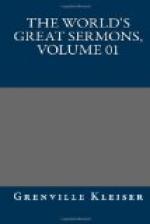That Job’s children were virtuous, appears from the fact that their father was particularly solicitous in regard to them, and rising up offered sacrifices in their behalf, fearing lest they might have committed secret sins; and no consideration was more important in his esteem than this. Not only the virtue of the children is thus shown, but also the affectionate spirit of the father. Since, therefore, the father was so affectionate, showing not only a love for them which proceeded from nature, but that also which came from their piety, and since the departed were thus virtuous, the anguish had a threefold intensity. Still further; when children are torn away separately, the suffering has some consolation; for those that are left alleviate the sorrow over the departed; but when the whole circle is gone, to what one of all his numerous children can the childless man now look?
Besides these causes of sorrow, there was a fifth stroke. What was that? That they were all snatched away at once. For if in the case of those who die after three or five days of sickness, the women and all the relatives bewail this most of all, that the deceased was taken away from their sight speedily and suddenly, much more might he have been distrest, when thus deprived of all, not in three days, or two, or one, but in one hour! For a calamity long contemplated, even if it be hard to bear, may fall more lightly through this anticipation; but that which happens contrary to expectation and suddenly is intolerable.
Would you hear of a sixth stroke? He lost them all in the very flower of their age. You know how very overwhelming are untimely bereavements, and productive of grief on many scores. The instance we are contemplating was not only untimely, but also violent; so that here was a seventh stroke. For their father did not see them expire on a bed, but they are all overwhelmed by the falling habitation. Consider then; a man was digging in that pile of ruins, and now he drew up a stone, and now a limb of a deceased one; he saw a hand still holding a cup, and another right hand placed on the table, and the mutilated form of a body, the nose torn away, the head crusht, the eyes put out, the brain scattered, the whole frame marred, and the variety of wounds not permitting the father to recognize the beloved countenances. You suffer emotions and shed tears at merely hearing of these things: what must he have endured at the sight of them? For if we, so long after the event, can not bear to hear of this tragedy, tho it was another man’s calamity, what an adamant was he to look on these things, and contemplate them, not as another’s, but his own afflictions! He did not give way to dejection, nor ask, “What does this mean? Is this the recompense for my kindness? Was it for this that I opened my house, that I might see it made the grave of my children? Did I for this exhibit every parental virtue, that they should endure such a death?” No such things




